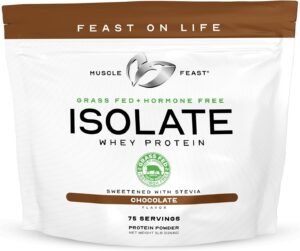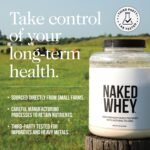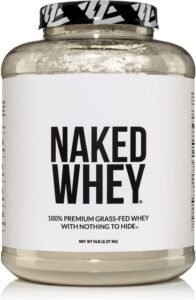Best Protein Powders 2025: Top Whey & Plant Options
Looking for the best protein powders 2025? Whether you’re into whey or plant-based, we’ve compared the top picks for muscle, energy, and clean nutrition—so you don’t have to guess what works.
Level up your nutrition and fitness goals? Best Protein Powders 2025 bring advanced formulas, better absorption, and cleaner ingredients. Whether you’re into whey or plant-based options, this year’s top picks offer something for every lifestyle and dietary need. In this guide, we highlight the best Best Protein Powders 2025 to fuel your workouts and support muscle recovery the smart way.
Introduction : 100% grass-fed whey protein powder : best-protein-powders-2025
Finding the right supplement in a market full of options can be overwhelming, especially when it comes to protein. That’s why we created this guide: Best Protein Powders 2025: Whey, Plant-Based & More Compared, to help you confidently choose what’s best for your body and lifestyle.
Protein is a vital macronutrient that supports muscle growth, recovery, immune function, and even weight management. Whether you’re an athlete, a busy professional, or someone trying to stay fit, getting enough quality protein each day is essential. In 2025, the demand for protein powders has surged, not just among gym-goers but also among people seeking better health through balanced nutrition.
This year, brands have introduced a wide range of innovative options — from classic whey protein to vegan and plant-based blends, collagen protein, and even organic, grass-fed formulas. But how do you know which one is right for you?
That’s exactly what this guide is for. We’ve researched and reviewed the most popular protein powders based on criteria like ingredient quality, protein content, taste, mixability, dietary suitability, and overall value. Whether you’re looking for something clean and natural, budget-friendly, or performance-enhancing, we’ve compared the best options available on the market.
So before you hit that “Buy Now” button, read on. Discover which protein powder fits your needs, goals, and lifestyle — and make 2025 your healthiest year yet.
Why Use Protein Powders in 2025?
As we move deeper into 2025, the demand for high-quality nutritional supplements continues to rise—especially protein powders. With increasingly fast-paced lifestyles and a greater emphasis on fitness, wellness, and longevity, protein supplementation is no longer limited to just bodybuilders or athletes. Today, the Best Protein Powders 2025 are designed to support a wide range of needs, from muscle building and weight management to energy support and active aging.
One of the primary reasons protein powders are so popular in 2025 is their ability to save time while delivering essential nutrients. Whether you’re a busy professional, a student on the go, or a parent juggling responsibilities, protein powders offer a convenient solution to maintain a balanced diet. A single scoop can provide 20–30 grams of high-quality protein, making it an excellent meal supplement or post-workout recovery option.
The evolution of fitness and health trends has also influenced the formulation of today’s protein powders. The best brands now prioritize clean, minimal-ingredient formulas that are free from artificial sweeteners, fillers, and allergens. Many options are now USDA Organic, Non-GMO Project Verified, and third-party tested for purity and potency. This shift toward transparency and clean nutrition is a major reason why many consumers are turning to the Best Protein Powders 2025 to meet their goals safely and effectively.
Another key development is the emergence of tailored protein formulas. In 2025, you’ll find protein powders specifically crafted for men, women, seniors, and athletes. These customized blends often include added nutrients such as collagen, probiotics, or BCAAs to support specific health outcomes like hormonal balance, joint health, or muscle recovery.
Ultimately, using the Best Protein Powders of 2025 means more than just getting enough protein—it’s about choosing smart, clean, and targeted solutions that align with your lifestyle and health objectives.
Understanding Protein Types : best-protein-powders-2025
When choosing a protein powder, it’s important to understand the different types available so you can pick the one that best fits your health goals and dietary needs. The two main categories are Whey Protein and Plant-Based Protein — each with unique benefits.
Whey Protein Best Protein Powders 2025
Derived from milk, whey protein is one of the most popular supplements, especially among athletes and fitness enthusiasts. It comes in three main forms:
Isolate: Contains over 90% protein with minimal fats and lactose, making it ideal for those who want a pure protein boost.
Concentrate: Slightly less processed with around 70-80% protein content; it contains more fats and lactose.
Hydrolysate: Pre-digested for faster absorption, often favored by those seeking rapid muscle recovery.
Plant-Based Protein : unflavored protein powder with no additives Best Protein Powders 2025
For those following a vegan or dairy-free diet, plant-based proteins offer excellent alternatives. These are typically made from:
Pea Protein: High in essential amino acids and easily digestible.
See Price on AmazonRice Protein: Rich in fiber and gentle on the stomach.
See Price on AmazonHemp Protein: Contains healthy fats and fiber along with protein.
See Price on AmazonMixed Blends: Combining multiple plant sources to provide a complete amino acid profile.
See Price on Amazon
Comparison: Protein Content & Absorption Rate : best-protein-powders-2025
Whey protein generally offers higher protein content per serving and faster absorption, making it great for post-workout recovery. On the other hand, plant-based proteins are often easier on digestion and contain additional nutrients like fiber and antioxidants but may have slightly lower absorption rates.
Choosing between these depends on your dietary restrictions, fitness goals, and personal preferences.
Top Protein Powder Picks of 2025 : Vist Fiverr More
Choosing the right protein powder can be overwhelming, but we’ve narrowed down the best options of 2025 across different categories to help you decide:
Whey Protein : clean whey protein for muscle growth
Optimum Nutrition Gold Standard Whey — Known for its excellent taste, high protein content, and great mixability, this remains a top favorite among athletes and fitness lovers.
Whey Isolate : best-protein-powders-2025

Muscle Feast Whey Protein Isolate – Pure, pasture-raised, and gluten-free protein powder ideal for clean nutrition.
Isopure Whey Isolate — A premium choice offering 100% pure protein with zero carbs and fats, perfect for those on a strict diet or with lactose sensitivity.
- See Price on Amazon
Plant-Based Protein Best Protein Powders 2025
Ritual Daily Shake and KOS Vegan Protein — These plant-based powders deliver complete amino acid profiles using clean, natural ingredients, ideal for vegans or those avoiding dairy.
Unflavored / Natural : undenatured whey protein supplement
Naked Pea and Form Pureblend — Minimalist protein powders with no artificial flavors or sweeteners, perfect for those who prefer natural nutrition or want to add protein to their recipes.
Premium Picks : best-protein-powders-2025
Ghost Nutter Butter — Combines great flavor with effective protein content, popular among taste-conscious consumers.
BioTrust Grass-Fed Whey — Sourced from grass-fed cows, this whey offers clean nutrition with enhanced nutrient profiles.
These picks cover a wide range of preferences and dietary needs, ensuring there’s a perfect protein powder for everyone in 2025.
How We Evaluated the Protein Powders : best-protein-powders-2025
To help you make the best choice, we carefully evaluated each protein powder based on key factors that matter most to users and experts alike:
Taste and Mixability : best-protein-powders-2025
A protein powder’s flavor and how well it mixes with liquids can make or break your experience. We tested each product for a smooth texture without clumps and a pleasant, natural taste — because a powder you enjoy is easier to stick with.
Protein Content per Serving Best Protein Powders 2025
We looked closely at the amount of protein provided in each serving, aiming for high-quality powders that deliver at least 20 grams of protein per scoop. This ensures effective muscle support and recovery.
Certifications and Quality Assurance Best Protein Powders 2025
Trust and safety are critical. We prioritized products with recognized certifications like NSF Certified for Sport and Informed Choice, which guarantee third-party testing for banned substances and quality control.
Price per Gram and Overall Value : best-protein-powders-2025
Getting the best bang for your buck matters. We calculated the price per gram of protein to find powders that offer excellent quality without breaking the bank — balancing cost with benefits to recommend products that give you real value.
This comprehensive evaluation ensures that our top picks aren’t just popular but also reliable, effective, and worth your investment.
Quick Comparison Table of Top Protein Powders 2025
| Brand | Protein Type | Protein (g) per Scoop | Certifications | Price per 30 Servings |
|---|---|---|---|---|
| Optimum Nutrition Gold Standard Whey | Whey Concentrate | 24 g | NSF Certified for Sport | $45 |
| Isopure Whey Isolate | Whey Isolate | 25 g | Informed Choice | $60 |
| Ritual Daily Shake | Plant-Based Blend | 20 g | Non-GMO, Vegan Certified | $80 |
| KOS Vegan Protein | Plant-Based Blend | 20 g | USDA Organic, Vegan | $50 |
| Naked Pea | Pea Protein (Unflavored) | 27 g | Non-GMO, Gluten-Free | $70 |
| Form Pureblend | Pea + Rice Protein | 23 g | NSF Certified, Vegan | $55 |
| Ghost Nutter Butter | Whey Blend | 25 g | Informed Choice | $65 |
| BioTrust Grass-Fed Whey | Grass-Fed Whey | 23 g | USDA Organic, Grass-Fed | $75 |
Notes: best-protein-powders-2025
Prices are approximate and may vary by retailer.
Certifications help ensure product safety and quality.
Protein content per scoop is rounded to nearest whole number.
Price Disclaimer : best-protein-powders-2025
Please note that prices may vary depending on the retailer, location, and ongoing promotions. We recommend checking the latest prices and offers before making a purchase to get the best deal.
Pros of best-protein-powders-2025
Improved Formulations
Most Best Protein Powders 2025 feature upgraded formulas with faster absorption and higher bioavailability.Variety of Choices
From whey isolate to vegan and plant-based options, Best Protein Powders 2025 cater to a wide range of dietary needs.Better Digestibility
Many brands in Best Protein Powders 2025 now include digestive enzymes to reduce bloating and enhance gut health.Enhanced Taste and Texture
New flavors and smoother blending make Best Protein Powders 2025 more enjoyable to consume daily.Supports Muscle Recovery & Growth
Ideal for post-workout recovery, Best Protein Powders 2025 help build lean muscle and reduce soreness.
Cons of best-protein-powders-2025
High Price Tags
Premium Best Protein Powders 2025, especially those with clean ingredients, often come at a higher cost.Artificial Additives in Some Brands
Some Best Protein Powders 2025 still contain artificial sweeteners, flavors, or fillers.Not Suitable for All Diets
Whey-based Best Protein Powders 2025 may not align with vegan, dairy-free, or certain restrictive diets.Possible Digestive Discomfort
Some users may experience bloating, gas, or stomach upset when trying new Best Protein Powders 2025.Risk of Overuse
Relying too much on Best Protein Powders 2025 instead of whole foods may cause nutritional imbalance.
Buying Guide: How to Choose the Right Protein Powder : best-protein-powders-2025
When selecting a protein powder, knowing what to look for ensures you get the best product suited to your needs and budget.
Check the Ingredient Label, BCAAs & Allergens : best-protein-powders-2025
Start by carefully reading the ingredient label. A high-quality protein powder contains clean, minimal ingredients without unnecessary fillers. Look for the presence of BCAAs (Branched-Chain Amino Acids), which are crucial for muscle repair and growth. Also, be mindful of allergens like dairy, soy, or gluten—especially if you have sensitivities or allergies.
Dietary Advice: Whey vs. Plant-Based for Lactose Intolerance
If you are lactose intolerant or sensitive to dairy, plant-based protein powders such as pea, hemp, or rice protein are better options. Whey protein powders may contain lactose, which can cause digestive discomfort. Plant-based options also often include fiber and other nutrients that support digestion.
Budget and Preferences : best-protein-powders-2025
Consider your budget and personal preferences when choosing:
Budget-Friendly: Whey concentrate or basic plant-based proteins offer good protein content at affordable prices.
Premium Options: Whey isolate, hydrolysate, grass-fed whey, or certified organic plant-based proteins provide higher purity, better taste, and often added health benefits.
Don’t choose a product just because it’s trendy or popular—focus on what fits your lifestyle, dietary needs, and fitness goals.
Final Thought: Best Protein Powders 2025
From organic plant blends to fast-absorbing whey isolates, the Best Protein Powders 2025 lineup is packed with powerful options to match your health goals. Prioritize clean ingredients, third-party testing, and your personal fitness objectives when making a choice. With the right Best Protein Powders 2025, you can boost recovery, energy, and performance with confidence.
Frequently Asked Questions (FAQs): best-protein-powders-2025
1. Whey vs Plant-Based – Which One Should I Choose? Best Protein Powders 2025
Whey is fast-absorbing and great for muscle building, while plant-based proteins are ideal for vegans and those with lactose intolerance. Choose based on your diet and goals.
2. Can Protein Powders Help with Weight Loss? best-protein-powders-2025
Yes, protein powders can increase fullness, reduce cravings, and help maintain muscle during weight loss when combined with a balanced diet and exercise.
3. Are Protein Powders Safe for Daily Use? Best Protein Powders 2025
Generally, yes. Use recommended doses and choose reputable brands. Consult a doctor if you have kidney or health concerns.
4. How Much Protein Do I Need Per Day? Best Protein Powders 2025
Most adults need about 0.8 to 1 gram of protein per kilogram of body weight, but athletes may require more, depending on their training.
5. Can I Use Protein Powder Without Working Out?
Yes, protein supports overall nutrition, but for muscle gain and fat loss, combining it with exercise is most effective.
6. What Are BCAAs and Why Are They Important? best-protein-powders-2025
Branched-Chain Amino Acids (BCAAs) help with muscle recovery and reduce soreness after workouts. Look for powders rich in BCAAs.
7. Is Whey Protein Suitable for People With Lactose Intolerance?
Whey isolate has very low lactose and may be tolerable; however, some people may prefer plant-based proteins to avoid discomfort.
8. Can Protein Powders Replace Whole Food Protein? Best Protein Powders 2025
Protein powders supplement your diet but should not completely replace whole food sources, which provide additional nutrients.
9. How Should I Store Protein Powder? best-protein-powders-2025
Keep it in a cool, dry place away from sunlight and moisture to maintain freshness and prevent clumping.
10. Are There Any Side Effects of Taking Too Much Protein Powder?
Excessive protein intake can strain kidneys and cause digestive issues. Stick to recommended serving sizes and consult a healthcare professional if unsure.
Conclusion: Final Verdict & Top Recommendations Best Protein Powders 2025
Our Top 3 Recommendations: Best Protein Powders 2025
Optimum Nutrition Gold Standard Whey – Best all-rounder for taste, quality, and value.
Isopure Whey Isolate – Ideal for those needing a pure, low-carb protein boost.
Ritual Daily Shake – Perfect plant-based choice with clean, natural ingredients.
Ready to take the next step? Best Protein Powders 2025
👉 Check Prices | 👉 Read Reviews | 👉 See Deals
Make 2025 the year you fuel your fitness with the best protein powder tailored to your needs!
Disclaimer: Best Protein Powders 2025
This article is for informational purposes only. The Best Protein Powders 2025 featured here are based on research, reviews, and general use cases. Always consult with a healthcare provider or nutritionist before starting any supplement, especially if you have allergies, health conditions, or dietary restrictions.







